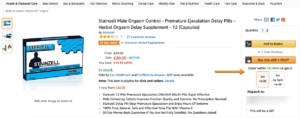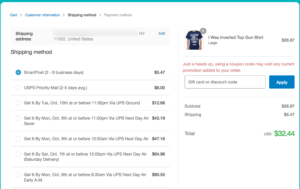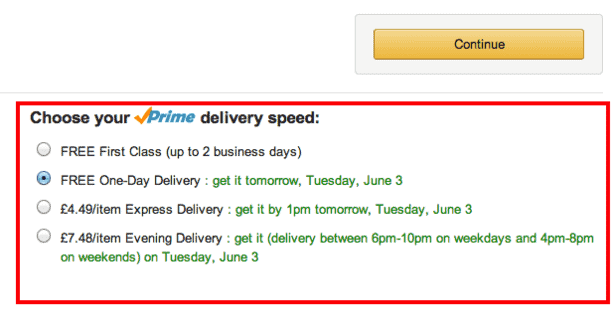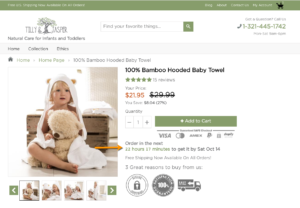Amazon is undeniably the world’s leader in stock control, warehousing, and logistics. Which makes it easy for them to tell you precisely when you’ll receive your order. Want to know how they do it? Then, continue reading to know what is Amazon’s secret weapon.
Because of this, It will come as no surprise to you that delivery prediction likely contributes significantly to their double-digit conversion rate.

But worryingly, for everyone else, research carried out by Milo revealed that 1 in 4 online shoppers abandon their purchase. And that’s because the estimated delivery date wasn’t available. And to make things worse, 38% also abandoned because the expected delivery date was longer than a week.
That’s bad news if you’re dropshipping and have longer delivery times… quoting 4-weeks delivery is going to be a complete conversion killer for your store.
Many Shopify store owners who dropship from AliExpress, wrongly assume that they can get around this by offering free shipping. But sadly, consumers aren’t always okay with waiting more than a week to receive their orders. The reality is that most online shoppers expect orders to be packed and shipped within a single business day. They also expect to receive shipments within a calendar week, regardless of the method used.
This means you need to not only process orders quickly but also ship them using a timely shipping service. More importantly, you need to tell shoppers in advance when they can expect delivery.

This is confirmed by The Baymard Institute’s Checkout Usability Study which shows that what users really care about is not “shipping speed” but rather the date of delivery, as in: “When will I receive my order?”
During their usability testing, the subjects frequently had big trouble comparing shipping options that displayed shipping speeds rather than delivery dates. The test subjects also often ended up misinterpreting shipping speeds and frequently miscalculated the arrival date…
Not good.
What’s more, if they don’t know your handling and despatch times, it gets even worse.
Perception is everything
By now, it should be abundantly clear that delivery dates will convert better than providing shipping speeds. But what’s interesting is that Baymard’s research also revealed that there are some important differences in how users perceive delivery dates.
Let me explain, the most important difference between delivery dates and shipping speeds is in the user’s perception: most of the test subjects during Baymard’s study took the stated delivery dates as a promise.
In other words, when a store stated that their order would “Arrive by October 14th”, the majority of the test subjects took that as a solemn promise that they would receive their order by then. This is in stark contrast to sites that only displayed shipping speeds. The ambiguity led to doubt, which is proof that showing shipping speeds will only serve to suppress your sales.

Perform Any Tricky Mental Arithmetic
When Baymard asked their test subjects to interpret Amazon’s shipping info, they instantly understood when they’d receive their order without having to perform any tricky mental arithmetic.
Here’s the thing, because users are more likely to see the stated delivery date as a promise by the store. It’s important that the calculation is as accurate as possible. Adding too much of a margin of error might cause users to abandon. And that’s because they feel the delivery options are unreasonably slow. If you add too little margin, users might end up disappointed by your store’s “broken promise”. While the latter may not have an immediate impact on conversion rates for the user’s current checkout session, it is likely to have profound long-term impacts if users perceive the site to be breaking its promise.
On the other hand, if you add too little margin, users might end up disappointed by your store’s “broken promise”. Whilst a broken promise may not have an immediate impact on conversion rates at the point of sale. It’s still likely to hurt your chances of making future sales to those customers.
If you can’t offer a precise day, then the next best thing is to quote a date range. Something like “Get it between Monday 9th & Wednesday 11th October.”
Offer Delivery Prediction
There’s a huge opportunity for you to trounce your competition because Baymard reported that 40% of the major e-commerce sites that they benchmarked failed to offer delivery prediction…
This means that if you help users know when they can expect to be unwrapping their latest purchase, you’ll see a lift in your conversions.
This is particularly important if your store sells products that are often bought as gifts. Many late shoppers will want peace of mind that their order will arrive in good time.
And because we have seen the conversion-boosting effect of offering delivery prediction first-hand. We built this feature into the Shoptimized™ Theme, it’s not on the Shopify Theme store. You can even do this on a per-product basis if you have multiple suppliers with different shipping times.

By clearly displaying the estimated shipping time for each of your products, you add reassurance and reduce the ambiguity relating to what the customer should expect. By meeting or even exceeding those expectations you can ensure that your customers have a great experience with your site and come back to buy again and again.


